29.1.2.4.6 (29 > 25)
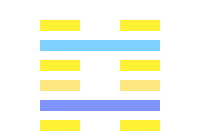
29.1.2.4.6 (29 > 25) - THE KHAN HEXAGRAM.
- 1. The first line, divided, shows its subject in the double defile, and (yet) entering a cavern within it. There will be evil.
- 2. The second line, undivided, shows its subject in all the peril of the defile. He will, however, get a little (of the deliverance) that he seeks.
- 4. The fourth line, divided, shows its subject (at a feast), with (simply) a bottle of spirits, and a subsidiary basket of rice, while (the cups and bowls) are (only) of earthenware. He introduces his important lessons (as his ruler's) intelligence admits. There will in the end be no error.
- 6. The topmost line, divided, shows its subject bound with cords of three strands or two strands, and placed in the thicket of thorns. But in three years he does not learn the course for him to pursue. There will be evil.
29.1.2.4.6 (29 > 25) - Forcing sympathy
One compels one's friends by posing as a victim.
Bing DeepL Google Yandex29.1.2.4.6 (29 > 25) - Forcing sympathy
One compels one's friends by posing as a victim.
Bing DeepL Google Yandex29.1.2.4.6 (29 > 25) - K’ân, l’abîme
K’ān : danger, précipice, caverne. — Tsa k’ān : courir de grands risques ; s’exposer au danger pour un autre.
- 1. Courir des dangers, comme entrer dans une caverne d’un défilé dangereux, est chose redoutable.
-
2. Dans les écueils périlleux, si on sait modérer ses sentiments, on pourra en sortir heureusement.
Si on garde la modération. - 4. Si l’on offre des sacrifices avec simplicité (sans ostentation), avec un vase de spiritueux et une corbeille de grains, tandis que les assistants n’ont que des vases de terre, si par cette modération on se forme à la vertu, alors qu’on aurait d’abord des difficultés et des écueils, on deviendra irréprochable. (Moyen d’éviter les dangers.)
- 6. Danger de celui qui, lié, vinculé de triples liens, enfermé dans un cachot, ne peut de longtemps parvenir à se délivrer. Sort funeste ! — Tel est celui qui a perdu la voie de la sagesse
29.1.2.4.6 (29 > 25) - Forcer la sympathie
On oblige ses amis en se posant en victime.
Bing DeepL Google Yandex29.1.2.4.6 (29 > 25) - Mélység
- 1. Ha egy nehézséggel találkozott, meg kell oldania mielőtt elkezdene foglalkozni egy másikkal.
- 2. Ha valaki túl nagy nehézségekkel kerül szembe, rá kell hagynia olyanokra akik tudják kezelni azokat.
- 4. Ha valaki eszközök híján van, meg kell elégednie egyszerű dolgokkal.
- 6. Ha túl fáradt, meg kell állnia és később folytatnia.
The trigrams
The trigrams are combinations of three yin and yang lines. The three bottom lines of the hexagram form the lower trigram and represent the inner situation. The three top lines form the upper trigram and represent the outer situation.
Upper trigram: The water The sky


Lower trigram: The water The thunder


The formation: 29
What is already there
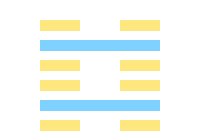
29 - THE KHAN HEXAGRAM.
Khan, here repeated, shows the possession of sincerity, through which the mind is penetrating. Action (in accordance with this) will be of high value.
Bing DeepL Google Yandex29 - K’ân, l’abîme
K’ān : danger, précipice, caverne. — Tsa k’ān : courir de grands risques ; s’exposer au danger pour un autre.
Texte
La droiture, le coeur fidèle et attaché, réussit ; ses actes ont de l’éclat s’il persévère malgré le danger.
Symbolisme
L’eau s’étendant au loin (deux fois eau) forme le Koua. Le sage, d’une vertu constante, agit vertueusement et s’applique à l’enseignement. Il répand ses biens comme l’eau.
Commentaire
Tsa k’ān est un danger grave. L’eau débordant, mais ne remplissant pas tout (que figure le Koua), représente les dangers courus sans qu’on perde sa fidélité constante. Le coeur attaché réussit ; quand la force garde le milieu, tout ce qu’on fait est bon et méritoire. Le ciel a ses dangers qu’on ne peut surmonter. La terre a les siens dans les montagnes, les fleuves et les ravins. Les rois et princes arrangent les choses dangereuses de manière à sauvegarder leurs États. Le moment du danger est bien grave.
29 - La profondeur
Quand les problèmes sont trop difficiles, on essaie de les contourner.
Bing DeepL Google Yandex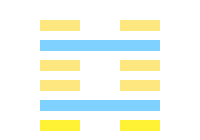
29.1 (29 > 60) - THE KHAN HEXAGRAM.
The first line, divided, shows its subject in the double defile, and (yet) entering a cavern within it. There will be evil.
Bing DeepL Google Yandex29.1 (29 > 60) - Dealing with problems in the right order
When one has encountered a difficulty, one must solve it before facing others.
Bing DeepL Google Yandex29.1 (29 > 60) - Dealing with problems in the right order
When one has encountered a difficulty, one must solve it before facing others.
Bing DeepL Google Yandex29.1 (29 > 60) - K’ân, l’abîme
K’ān : danger, précipice, caverne. — Tsa k’ān : courir de grands risques ; s’exposer au danger pour un autre.
Courir des dangers, comme entrer dans une caverne d’un défilé dangereux, est chose redoutable.
Bing DeepL Google Yandex29.1 (29 > 60) - Traiter les problèmes dans l'ordre
Quand on a rencontré une difficulté, on doit la résoudre avant d'en affronter d'autres.
Bing DeepL Google Yandex29.1 (29 > 60) - Mélység
Ha egy nehézséggel találkozott, meg kell oldania mielőtt elkezdene foglalkozni egy másikkal.
Bing DeepL Google Yandex
29.2 (29 > 8) - THE KHAN HEXAGRAM.
The second line, undivided, shows its subject in all the peril of the defile. He will, however, get a little (of the deliverance) that he seeks.
Bing DeepL Google Yandex29.2 (29 > 8) - Passing the buck
When one encounters difficulties that are too great, one leaves them to those who know how to handle them.
Bing DeepL Google Yandex29.2 (29 > 8) - Passing the buck
When one encounters difficulties that are too great, one leaves them to those who know how to handle them.
Bing DeepL Google Yandex29.2 (29 > 8) - K’ân, l’abîme
K’ān : danger, précipice, caverne. — Tsa k’ān : courir de grands risques ; s’exposer au danger pour un autre.
Dans les écueils périlleux, si on sait modérer ses sentiments, on pourra en sortir heureusement.
Si on garde la modération.
29.2 (29 > 8) - S'en remettre aux autres
Quand on rencontre des difficultés trop grandes, on laisse faire ceux qui savent les résoudre.
Bing DeepL Google Yandex29.2 (29 > 8) - Mélység
Ha valaki túl nagy nehézségekkel kerül szembe, rá kell hagynia olyanokra akik tudják kezelni azokat.
Bing DeepL Google Yandex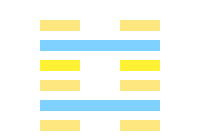
29.4 (29 > 47) - THE KHAN HEXAGRAM.
The fourth line, divided, shows its subject (at a feast), with (simply) a bottle of spirits, and a subsidiary basket of rice, while (the cups and bowls) are (only) of earthenware. He introduces his important lessons (as his ruler's) intelligence admits. There will in the end be no error.
Bing DeepL Google Yandex29.4 (29 > 47) - Living sparsely
When one has little means, one is content with simple things.
Bing DeepL Google Yandex29.4 (29 > 47) - Living sparsely
When one has little means, one is content with simple things.
Bing DeepL Google Yandex29.4 (29 > 47) - K’ân, l’abîme
K’ān : danger, précipice, caverne. — Tsa k’ān : courir de grands risques ; s’exposer au danger pour un autre.
Si l’on offre des sacrifices avec simplicité (sans ostentation), avec un vase de spiritueux et une corbeille de grains, tandis que les assistants n’ont que des vases de terre, si par cette modération on se forme à la vertu, alors qu’on aurait d’abord des difficultés et des écueils, on deviendra irréprochable. (Moyen d’éviter les dangers.)
Bing DeepL Google Yandex29.4 (29 > 47) - Vivre chichement
Quand on a peu de moyens, on se contente de choses simples.
Bing DeepL Google Yandex29.4 (29 > 47) - Mélység
Ha valaki eszközök híján van, meg kell elégednie egyszerű dolgokkal.
Bing DeepL Google Yandex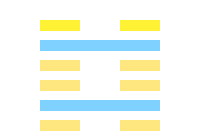
29.6 (29 > 59) - THE KHAN HEXAGRAM.
The topmost line, divided, shows its subject bound with cords of three strands or two strands, and placed in the thicket of thorns. But in three years he does not learn the course for him to pursue. There will be evil.
Bing DeepL Google Yandex29.6 (29 > 59) - Pausing
When it is too tiring, one can stop and resume later.
Bing DeepL Google Yandex29.6 (29 > 59) - Pausing
When it is too tiring, one can stop and resume later.
Bing DeepL Google Yandex29.6 (29 > 59) - K’ân, l’abîme
K’ān : danger, précipice, caverne. — Tsa k’ān : courir de grands risques ; s’exposer au danger pour un autre.
Danger de celui qui, lié, vinculé de triples liens, enfermé dans un cachot, ne peut de longtemps parvenir à se délivrer. Sort funeste ! — Tel est celui qui a perdu la voie de la sagesse
Bing DeepL Google Yandex29.6 (29 > 59) - Mettre en pause
Quand c'est trop fatiguant, on peut s'arrêter et reprendre plus tard.
Bing DeepL Google Yandex29.6 (29 > 59) - Mélység
Ha túl fáradt, meg kell állnia és később folytatnia.
Bing DeepL Google YandexIn the making: 25
What is poised to happen

25 - THE WÛ WANG HEXAGRAM.
Wû Wang indicates great progress and success, while there will be advantage in being firm and correct. If (its subject and his action) be not correct, he will fall into errors, and it will not be advantageous for him to move in any direction.
Bing DeepL Google Yandex25 - Carelessness
When one overlooks the future, one will not see what is coming.
Bing DeepL Google Yandex25 - Carelessness
When one overlooks the future, one will not see what is coming.
Bing DeepL Google Yandex25 - Wu wâng, l’innocence, l’imprévu
Wu wāng : sans blâme, irréprochable, honnête.
Texte
Conduite irréprochable ; absence d’inconduite, de manque de droiture, etc. Si l’on n’est pas droit et juste, il arrivera des malheurs. Tout sera sans avantage quoi que l’on fasse.
Symbolisme
Le tonnerre roulant sous le ciel. Toute chose est droite en sa nature. Les anciens rois, conséquemment, dans leurs efforts, se conformaient aux raisons pour entretenir leurs peuples. Com. II. — Le fort du dessus domine tout. (Trigramme du ciel.) Agissant fortement, il établit solidement. Il garde le milieu, il est ce qu’il doit être.
Commentaire
Par la droiture on prospère grandement, c’est l’ordre du ciel. Si l’on n’est pas juste, on sera malheureux, on ne réussira en rien. Quelle est la conséquence de la droiture ? Quel acte de l’homme irréprochable le ciel ne secondera-t-il pas par son ordre ?
25 - L'insouciance
Quand on néglige l'avenir, on ne verra pas ce qui vient.
Bing DeepL Google YandexThe nuclear hexagram: 27.1.3.5 (27 > 53)
The nuclear hexagram is the association of the two inner trigrams (lines 2,3,4 and 3,4,5). It represents the root, or the origin of the situation.
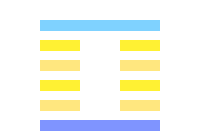
27.1.3.5 (27 > 53) - THE Î HEXAGRAM.
- 1. The first line, undivided, (seems to be thus addressed), ‘You leave your efficacious tortoise, and look at me till your lower jaw hangs down.’ There will be evil.
- 3. The third line, divided, shows one acting contrary to the method of nourishing. However firm he may be, there will be evil. For ten years let him not take any action, (for) it will not be in any way advantageous.
- 5. The fifth line, divided, shows one acting contrary to what is regular and proper ; but if he abide in firmness, there will be good fortune. He should not, (however, try to) cross the great stream.
27.1.3.5 (27 > 53) - Discovering an unexpected angle
One becomes aware of an idea that one had neglected.
Bing DeepL Google Yandex27.1.3.5 (27 > 53) - Discovering an unexpected angle
One becomes aware of an idea that one had neglected.
Bing DeepL Google Yandex27.1.3.5 (27 > 53) - I, l’alimentation
Ī : 1. Entretenir, soutenir ; 2. Menton, côté de la bouche ; 3. Profond.
-
1. Laissant là votre tortue merveilleuse (l’une des quatre espèces d’êtres surnaturels), vous me regardez remuant le menton (2e sens) (pour manger). — (Expression consacrée, signifiant négliger les biens supérieurs pour s’attacher aux biens matériels.) C’est mal. — La tortue céleste qui indique l’avenir ne se peut manger ; aussi on la néglige.
Note. Animaux célestes indiquant par leurs apparitions les volontés du ciel et de l’avenir. Les autres sont la licorne, le dragon et le phénix. -
3. Celui qui agit mal dans la recherche de son entretien déchoira certainement. En dix ans, il ne fera rien qui lui soit avantageux. (Litt. : qu’il ne fasse rien.)
Il rencontrera de grands obstacles. - 5. Si l’on viole les règles, quand même on serait en voie de prospérité, on ne réussira pas définitivement dans les grandes difficultés.
27.1.3.5 (27 > 53) - Découvrir un angle inattendu
On prend conscience d'une idée que l'on avait négligée.
Bing DeepL Google Yandex27.1.3.5 (27 > 53) - Ellátás
- 1. Nehéz problémával kerül szembe de elutasítja a barátai támogatását. Engednie kell cselekedni őket mielőtt a helyzet rosszabbra fordul.
- 3. Elhanyagolja az ellátást.
- 5. Elterel hogy megvédje a barátait.
Ruler
The starting situation

29.6 (29 > 59) - THE KHAN HEXAGRAM.
The topmost line, divided, shows its subject bound with cords of three strands or two strands, and placed in the thicket of thorns. But in three years he does not learn the course for him to pursue. There will be evil.
Bing DeepL Google Yandex29.6 (29 > 59) - Pausing
When it is too tiring, one can stop and resume later.
Bing DeepL Google Yandex29.6 (29 > 59) - Pausing
When it is too tiring, one can stop and resume later.
Bing DeepL Google Yandex29.6 (29 > 59) - K’ân, l’abîme
K’ān : danger, précipice, caverne. — Tsa k’ān : courir de grands risques ; s’exposer au danger pour un autre.
Danger de celui qui, lié, vinculé de triples liens, enfermé dans un cachot, ne peut de longtemps parvenir à se délivrer. Sort funeste ! — Tel est celui qui a perdu la voie de la sagesse
Bing DeepL Google Yandex29.6 (29 > 59) - Mettre en pause
Quand c'est trop fatiguant, on peut s'arrêter et reprendre plus tard.
Bing DeepL Google Yandex29.6 (29 > 59) - Mélység
Ha túl fáradt, meg kell állnia és később folytatnia.
Bing DeepL Google YandexCorrection
The direction where the ruler is going to bend
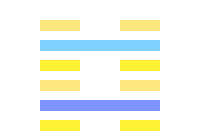
29.1.2.4 (29 > 17) - THE KHAN HEXAGRAM.
- 1. The first line, divided, shows its subject in the double defile, and (yet) entering a cavern within it. There will be evil.
- 2. The second line, undivided, shows its subject in all the peril of the defile. He will, however, get a little (of the deliverance) that he seeks.
- 4. The fourth line, divided, shows its subject (at a feast), with (simply) a bottle of spirits, and a subsidiary basket of rice, while (the cups and bowls) are (only) of earthenware. He introduces his important lessons (as his ruler's) intelligence admits. There will in the end be no error.
29.1.2.4 (29 > 17) - Not making too many concessions
One refuses to let others take command of operations.
Bing DeepL Google Yandex29.1.2.4 (29 > 17) - Not making too many concessions
One refuses to let others take command of operations.
Bing DeepL Google Yandex29.1.2.4 (29 > 17) - K’ân, l’abîme
K’ān : danger, précipice, caverne. — Tsa k’ān : courir de grands risques ; s’exposer au danger pour un autre.
- 1. Courir des dangers, comme entrer dans une caverne d’un défilé dangereux, est chose redoutable.
-
2. Dans les écueils périlleux, si on sait modérer ses sentiments, on pourra en sortir heureusement.
Si on garde la modération. - 4. Si l’on offre des sacrifices avec simplicité (sans ostentation), avec un vase de spiritueux et une corbeille de grains, tandis que les assistants n’ont que des vases de terre, si par cette modération on se forme à la vertu, alors qu’on aurait d’abord des difficultés et des écueils, on deviendra irréprochable. (Moyen d’éviter les dangers.)
29.1.2.4 (29 > 17) - Ne pas trop faire de concessions
On refuse de laisser les autres prendre le commandement des opérations.
Bing DeepL Google Yandex29.1.2.4 (29 > 17) - Mélység
- 1. Ha egy nehézséggel találkozott, meg kell oldania mielőtt elkezdene foglalkozni egy másikkal.
- 2. Ha valaki túl nagy nehézségekkel kerül szembe, rá kell hagynia olyanokra akik tudják kezelni azokat.
- 4. Ha valaki eszközök híján van, meg kell elégednie egyszerű dolgokkal.

